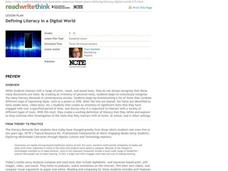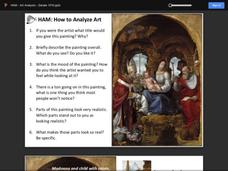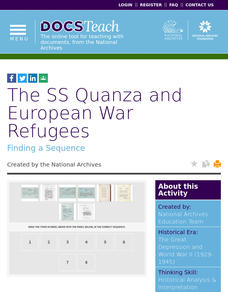National Constitution Center
Explore Rights Around the World
How has the American Bill of Rights influenced the rest of the world? An interactive web activity helps individuals see the similarities between countries' bills of rights. A text-to-text tool compares the American Bill of Rights to...
Curated OER
Declaration of the Rights of Man
As your historians examine the French Revolution, have them read "Declaration of the Rights of Man" in its entirety; it's not very long, and it gives them a great authenticity to understanding the efforts of the French people. After...
EngageNY
Qualities of a Strong Literary Argument Essay
One activity, two essays, and one central theme: qualities of an argument essay. Here, scholars first describe the qualities of an argument essay regarding Bud's rules to live by from the novel Bud, Not Buddy by Christopher Paul Curtis....
ReadWriteThink
Defining Literacy in a Digital World
What skills are necessary to interact with different types of text? Twenty-first century learners live in a digital world and must develop a whole new set of skills to develop media literacy. Class members engage in a series of...
National Woman's History Museum
Tea with Penelope: A 2-Point Perspective of the Edenton Tea Party
A brief introduction to Penelope Barker sets the stage for a discussion about political cartoons and the persuasive technique used to create them. A graphic organizer aids scholars in the analysis of a piece of work using a 2-point...
Smithsonian Institution
A New America: The Hart-Celler Immigration Act of 1965
Many dream of coming to America, but few may enter. The instructional activity explores the Hart-Celler Immigration Act of 1965 and how it changed immigration policies in the United States. Academics learn how immigration quotas impacted...
EngageNY
Reading for Gist: “Middle Ages” Excerpt 2
Read and repeat. Scholars repeat the strategies for digging deeper into text from instructional activity two. This time they focus on Middle Ages Excerpt 2. Learners write unfamiliar words in the word catcher and use details from the...
EngageNY
Reading for Gist: “Middle Ages” Excerpt 1
Dig deep. Scholars dig deep for meaning while reading Middle Ages Excerpt 1. They begin by finding unfamiliar words and adding them to a word catcher. Pupils then take a close look at adversity in the text and complete an anchor chart.
Ohio Literacy Resource Center
Compare & Contrast Essay
Comparing two texts can build a greater understanding of the texts and themes of the works. Take some time to follow the steps here to guide your pupils through the process of composing compare-and-contrast essays.
Curated OER
Conceptual Analysis in Economics
Help develop assertive, critical-thinking skills that enhance growth and change while teaching economics. In groups, select a topic from a list and then discuss the pros and cons of each topic. Debate why advertising is necessary to our...
Mr. Roughton
How to Analyze Art
How does analyzing art differ from analyzing text? Young historians consider a piece of Italian Renaissance art and practice another type of primary source analysis through a close look and discussion of Bernardo Zenale's Madonna and...
DocsTeach
The SS Quanza and European War Refugees
World War II not only resulted in major loss of life, but it also displaced thousands of people. An eye-opening activity uses primary documents to explore the refugee crisis during World War II. Scholars compare the event to modern-day...
Media Smarts
Broadcasting Codes
Let your learners be the judges for a series of case studies that focus on broadcast codes in Canada. In order to familiarize your class with the codes and guidelines that govern the broadcasting industry, in particular Canada's...
Curated OER
Sor Juana, la monja y la escritora: Las Redondillas y La Respuesta
Sor Juana, considered one of the first feminist writers and a great Latin American poet, is the topic and inspiration for this excellent instructional activity. Use the introduction, guiding questions, and learning objectives to lead...
EngageNY
Building Background Knowledge: The Dinka and Nuer Tribes
Building on a previous lesson plan, readers continue using context clues to learn new vocabulary. Additionally, they continue working on their Gathering Evidence graphic organizers, making connections between an informational text and A...
EngageNY
Mid-Unit 1 Assessment: Analyzing an Interview with a Rainforest Scientist Part 1
What's it like to study snakes, reptiles, and turtles in their natural habitats? Serving as the mid-unit assessment, pupils read an interview with a rainforest scientist. Next, they analyze the text and answer text-dependent questions.
EngageNY
Close Reading and Viewing: Nunavut Iron Ore Mine Approval
Using the thought-provoking resource, scholars continue researching opposing points of view about the Mary River Project proposal. They read an informational text, watch a video, and record the gist of the text and video in their journals.
T. Smith Publishing
Earth
Young astronomers read an informational text passage and then answer questions based on what they read.
TLS Books
Neptune
Did you know that Neptune is named after the Roman god of the sea? Young astronomers read about this and other facts about the eighth planet from the sun in a short informational text passage.
TLS Books
Uranus
After reading an informational text passage, learners answer four multiple choice questions about the third largest planet in our solar system.
TLS Books
Jupiter
Young astronomers read an informational text on the gas giant, Jupiter. Then they answer four multiple choice questions based on what they read.
Preswick House
Teaching Unit: Invisible Man
Invisible Man is a core text in high school literature classes and one of the most cited works on the AP Literature and Composition exam. Instructors new to using Ralph Ellison's novel and those who have long included it as part of their...
National Endowment for the Humanities
“Read All About It”: Primary Source Reading in “Chronicling America”
Can investigative journalism become too sensationalistic and accusatory, or is it vital for the survival of a democracy? Middle schoolers analyze primary source documents from early 20th-century newspapers as well as Theodore Roosevelt's...
Curated OER
1750 BC: The Code of Hammurabi
Have pupils explore the Code of Hammurabi, one of the oldest sets of laws. They get into groups to read, analyze, and answers 5 critical-thinking questions about 2 of the provided laws. Then they report what they have learned. Great...

























